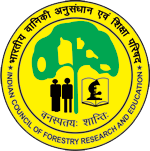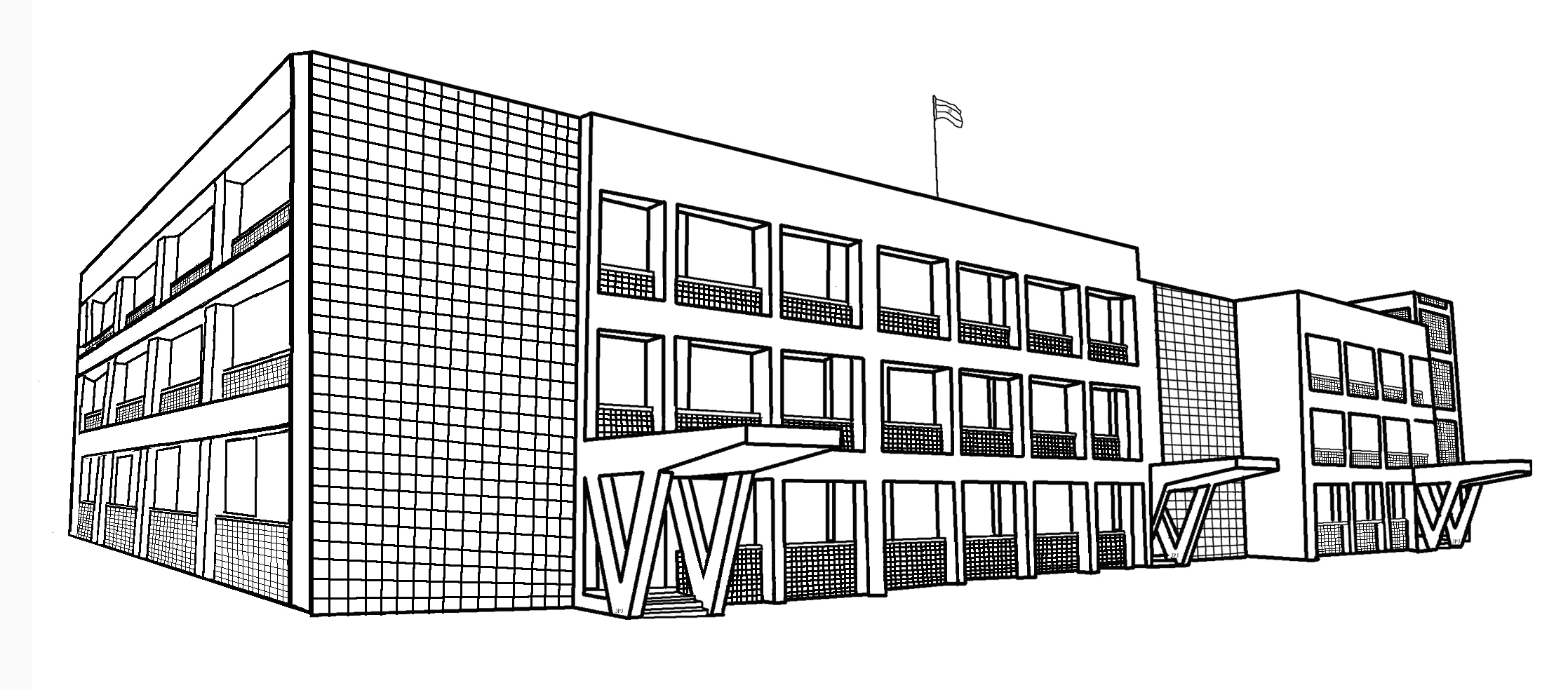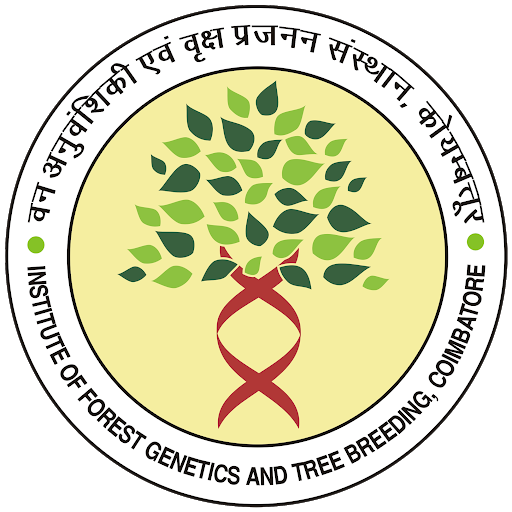Genetics & Tree Improvement / Achievements
- Varietal development and commercialization in pulpwood species
- Increasing the productivity of forest plantation species has been the focus of research and development activities taken up by the GTI Division.
Important achievements made in the recent years are given be
(i) Implemented long term breeding programmes for Acacia, Casuarina and Eucalyptus since 1995 with collaboration from the Australian Tree Seed Centre, CSIRO. Second generation breeding populations were converted into seeding seed orchards through selection and thinning. Seeds collected and supplied to farmers and third generation breeding populations are being established. The average productivity of plantations raised with these seeds recorded an average genetic gain of 20%.
(ii) Developed and released 25 high-yielding clones of Casuarina and Eucalyptus suitable for cultivation in different parts of the country. These clones possess many desirable characters like fast growth, stem straightness, high pulp yield, tolerance to drought and pests and suitability for cultivation in sodic soils. They have a high productivity with an average genetic gain of 40% over seedlings.
(iii) Developed guidelines for DUS testing (Distinctiveness, Uniformity and Stability) of Ailanthus, Casuarina, Eucalyptus and Teak under the provisions of Protection of Plant Varieties and Farmers Rights Act, 2001 to facilitate registration of Casuarina varieties for granting legal ownership. As a first instance in forestry sector, the Protection of Plant Varieties and Farmers Rights Authority, Govt. of India has notified IFGTB, Coimbatore as a DUS Centre for Casuarina under the Act to conduct DUS tests for applications received for registration of varieties. Six applications for registering IFGTB's Casuarina and Eucalyptus are being processed in the Authority for granting IPR protection.
iv) Evaluated 25 seed sources of Leucaena leucocephala from India and abroad and developed seed production areas with superior sources. Seeds supplied to farmers and paper industries yielded 15% gain over unimproved seed. Selected 25 clones for fast growth, axis persistence, stem straightness, high pulp yield and low fecundity and deployed in multilocation testing.
(v) In collaboration with the Australian Tree Seed Centre, CSIRO, Canberra introduced a new set of Eucalyptus species commonly called as 'mallees' which are highly adapted to arid and semi-arid conditions. Selected E. polybractea for high oil content and E. herbartiana and E. gillineii for wood production through multilocation testing in low-rainfall areas.
(vi) Second generation progeny trials established with a broad genetic base of Acacia auriculiformis have been converted into seedling orchards and seeds collected and supplied to tree growers. Selected outstanding individuals were clonally propagated and deployed in multilocation clonal trials. Early selections from these trials are being planted in large clone-proving trials to determine their superiority for public release and large scale planting.
(vii) As part of an international series of testing coordinated by the Australian Tree Seed Centre, CSIRO, Australia a new set of natural provenances of Acacia mangium were deployed in trials in Assam and Karnataka States. These provenances have so far not been subjected to testing and they are expected to broaden the genetic base available in the country and also provide superior seed sources for planting and breeding programmes.
Genetic improvement of indegenious trees
(i) Systematic tree improvement programme has been initiated in T. populnea at IFGTB since 2011 and Plus Trees numbering 139 have been selected from Tamil Nadu, Kerala and Puducherry with straight stem and vigour. Among them 86 rooted clones were propagated through rooting and a Clonal Multiplication Area was established at Panampally Research Centre of IFGTB near Palakkad, Kerala. No major pest attack was observed in the assemblage. A clonal test has been established to select the most promising clones for large scale cultivation.
(ii) A broad-based germplasm involving more than 80 seed source and family accessions of Ailanthus excelsa were assembled in different agroclimatic regions. These trial plots have been converted into seed production areas by removing inferior accessions and individuals. Outstanding individuals were vegetatively propagated and deployed in multilocation clonal testing in contrasting locations. Research is underway to standardize rooting and grafting techniques for commercial scale propagation of outstanding clones.
(iii) Tamarindus indica trees with outstanding and desirable traits like high fruit yield, high sucrose content and anthocyanin content in fruit pulp were selected from Peninsular region. Grafts of selected trees are assembled in field stations and used as scion source for further multiplication for testing and plantation development. Established multilocation clonal test plots to select most superior clones for the end use character and release for large scale planting. Developed a package of practices to enhance flower and fruit yield in seedling and clonal plantations.
(iv) Selected around 100 candidate plus trees of Gmelina arborea from natural and planted populations in the southern States and established progeny trials in different agroclimatic regions. Outstanding trees with fast growth, straight stems and axis persistence have been selected from the progeny trials and vegetatively propagated through rooting of stem cuttings. Clones were deployed in multilocation testing to select the most superior accessions for public release and large scale planting programmes.
(v) Completed a NDF (Non Destructive Finding) study on the natural populations of Pterocarpus santalinus for developing strategies for sustainable management of this narrowly endemic and high value tree species. Through this study IFGTB has been designated as the Scientific Authority for the species under CITES. Assembled a broad-based germplasm collection with nearly 100 accessions. Outstanding trees selected in natural and planted populations were characterized for growth, wood and molecular characters. They were also propagated through micropropagation in collaboration with a private industry under the DBT’s BIRAC scheme.
Industrial Collaboration and Community Participation
(i) In order to meet the challenge of making the new high-yielding varieties accessible and affordable to a large number of farmers and other tree growers, partnerships have been established with wood-based industries and private nurseries for mass multiplication and supply of superior planting material. Backed by IPR protection obtained through registration under PPVFR Act, 2001, non-exclusive licenses have been granted to seven paper industries and nurseries for commercial use of the clones against payment of Rs.35,00,000/- as one-time license fee.
(ii) The licensees have produced and supplied around 70 million plants during 2015-19 and planted in about 50,000 ha. With the popularity of the clones increasing, the cultivation area is expected to double during the next three years. It is estimated that farmers could get an additional income of around Rs. 51.2 crores from the 6,400 ha harvested during 2018-19 due to increased productivity of the genetically superior clones.
(iii) A network project involving five paper industries viz., Tamil Nadu Newsprint and Paper Limited, International Paper APPM Limited, Ballarpur Industries Limited, JK Papers and West Coast Papers Limited and coordinated by IFGTB was undertaken to genetically improve two important pulpwood species, Casuarina and Leucaena. The project was supported by the Indian Paper Manufacturers Association (IPMA) through cess funding from Government of India. New germplasm of Casuarina was introduced in the form of provenances and landraces from diverse source with collaboration from the Australian Tree Seed Centre, CSIRO, Australia. Extensive selection of superior trees of Leucaena was made from plantations existing in different locations. The five partner industries established 6 provenance trials of Casuarina, 5 clonal trials of Casuarina and 6 Seed source trials of Leucaena. Provenance, seed source and clonal accessions most suitable for planting in the respective locations were identified.
(iv) Wood-based industries are involved in the ongoing programmes in order to make them self-supporting and to reduce the time taken to transfer the research results to end users. As per the IPR management policy of ICFRE, a part of the license fee collected is used for advancing the Casuarina breeding programme from second to third generation. Industries were provided paid consultancy services for establishing their own seed orchards and genetic gain cum on-farm demonstration plots. Currently multilocation testing of a new set of Casuarina and Leucaena clones is undertaken with the collaboration and funding support of paper industries in the areas where large-scale pulpwood plantations are raised.
(v) Community seed orchards were developed in government / village land using the genetically superior varieties to meet the local seed demand. The progressive farmers and traditional nursery operators are trained in the latest techniques of planting stock production and support given to market their seedlings through farm forestry programmes of the industries. Such decentralized nurseries help the smallholding farmers to access the benefits of high-yielding varieties developed through breeding programmes.
(vi) A broad genetic base is a prerequisite for multi-generation breeding aimed at continuous genetic improvement of economically important characters of a given species. A large number of research assets in the form of provenance-family trials, clonal trials, vegetative multiplication gardens, gene resource populations, seed orchards and hybridization orchards spread over an area of 30 ha and housing a worldwide collection of germplasm in different agro-climatic regions are being maintained for long-term improvement through selection and breeding. Sustaining international research collaborations with CSIRO, Australia, University of Hawaii, USA, Research Institute for Tropical Forestry, China and Kasetsart University, Thailand.





